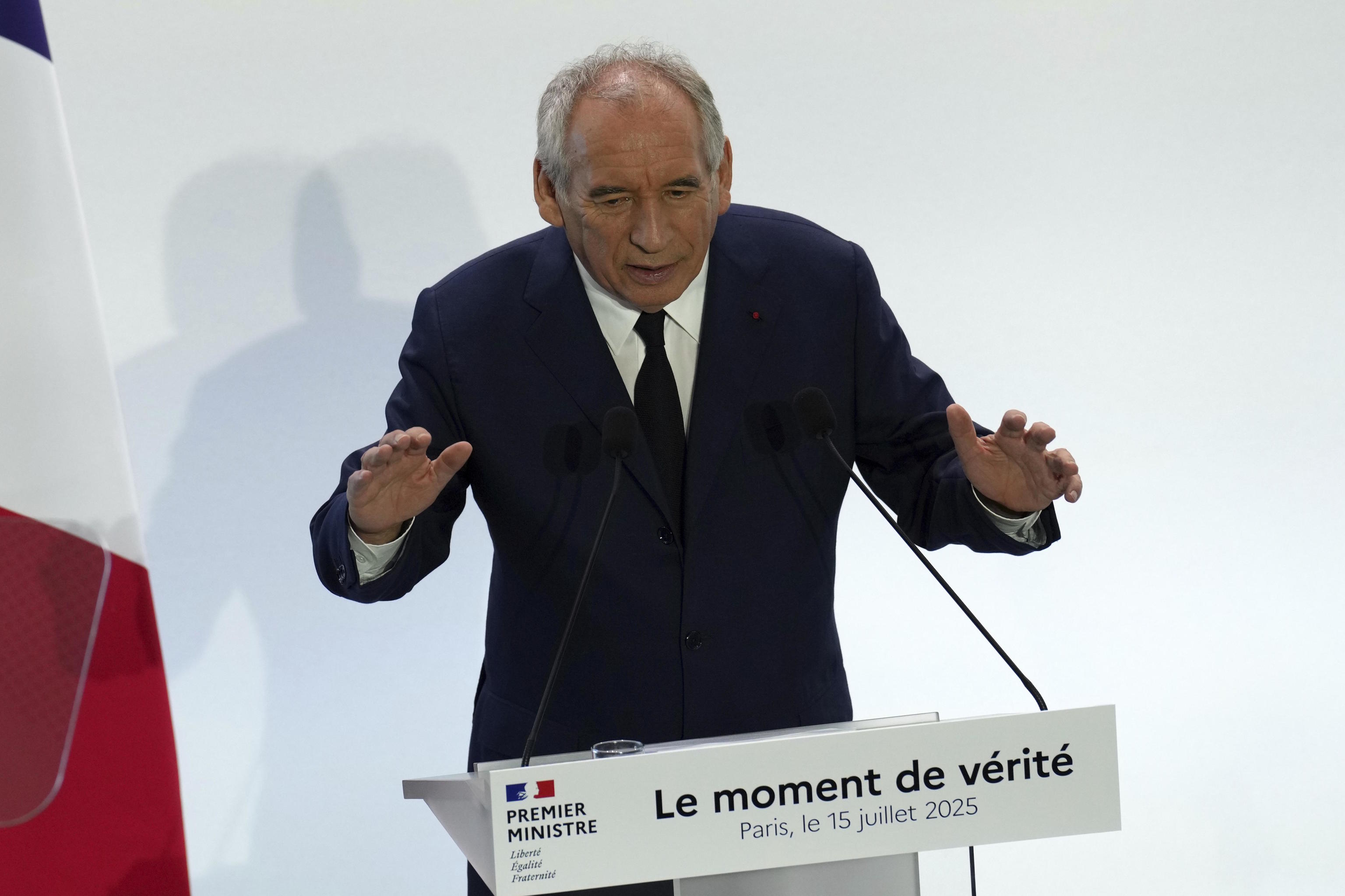French Prime Minister, François Bayrou, is on thin ice after presenting the "main lines" of the 2026 budget, which includes freezing pensions, eliminating two public holidays, and the almost impossible mission of cutting 43.8 billion euros mainly in social spending. The goal is to reduce the public deficit to 4.6% of GDP (with the added challenge of increasing Defense spending by 3.5 billion euros as expressly requested by President Emmanuel Macron).
The left-wing parties bloc attended the meeting in the National Assembly with the threat of presenting the ninth vote of no confidence against Bayrou, who barely survived the last one two weeks ago. Now, the leader of the National Rally, Marine Le Pen, has joined forces for the first time with the leader of France Unbowed, Jean-Luc Mélenchon, and has threatened to support a vote of no confidence from right to left that would bring down the centrist Prime Minister.
"This Government prefers to attack the French people, workers, and retirees, rather than tackle wasteful spending", stated Marine Le Pen. "The elimination of two significant holidays such as Easter Monday and May 8th [Victory Day] is a direct attack on our history and roots," echoed her protégé, Jordan Bardella.
"Bayrou further reinforces the absurdity of Macron's policies: destroying the State and public services to make room for the market and make the masses pay to forgive the very rich," warned Mélenchon. "The race towards economic, financial, and social abyss will continue to the dismay of all... It is urgent to end macronism. Bayrou must go."
Olivier Faure, Secretary-General of the Socialist Party, denounced the "violence of a brutal and unacceptable budget" that, in his opinion, signifies "the demolition of the French system." The Socialist Party precisely presented the eighth motion of no confidence in seven months against François Bayrou's Government two weeks ago, which survived thanks to the temporary support of the National Rally, which it may now lose.
The centrist Prime Minister, who took office in December 2024 after Michel Barnier's fall, arrived at the inevitable budget meeting in the midst of a heatwave with a record low in popular approval (17%), heavily affected by eight successive votes of no confidence and the scandal of physical and sexual abuse at the Bétharram Catholic school (where his children studied when he was Minister of Education).
"We do not want a Greek-style scenario for France", explained Bayrou, arguing how the country allocates an amount equivalent to 57% of its GDP to social spending, compared to the EU average of 49%. "We are addicted to public spending, state spending... We have the highest social spending in the country. And yet the French are increasingly dissatisfied with public services. We are the most pessimistic country."
"What I propose is a multi-year plan to return to debt balance in four years," explained Bayrou when evaluating the effort to save the equivalent of 44 billion euros in the budgets and extend his self-described "realistic" recipe.
The first measure consists of what is technically known as a "blank year": freezing social spending between 2025 and 2026 without considering inflation, resulting in savings of around 5 billion euros. The second set of proposals would affect cuts in tax benefits, public aid to companies and state bodies, and state operators.
The toughest battle will possibly be the unemployment insurance reform, with stricter rules to qualify for benefits. Bayrou also proposes a general reduction in all ministerial departments, except Defense.
"The Government, in line with the President of the Republic, undertakes to protect our national defense for the future, against new threats and the new weapons necessary to ensure our security," added Bayrou. "This will result in additional investments of around 3.5 billion euros in 2026 and 3 billion in 2027."
The Prime Minister anticipated an "efficiency cure" at all levels of Government. "We will eliminate unproductive agencies that are dispersing state resources," he stated, acknowledging that between 1,000 and 1,500 public sector jobs will be eliminated through "mergers" and department closures.
In a direct reference to the two red lines drawn in advance by unions and left-wing parties, Bayrou highlighted that his cuts "will not involve a decrease in public sector salaries or a reduction in retirement pensions."
"The reconquest of productivity is as crucial as the fight against budget imbalances," concluded the centrist political leader, who called for "a special effort" from the French with the elimination of two public holidays: Easter Monday and May 8th, Victory Day in Europe ("May has become a Swiss cheese where people jump from viaduct bridges during holidays").
When outlining his main points for the next budget, Bayrou stated that he is open to "other ideas" by autumn when the National Assembly is expected to vote on his proposals.
During the preliminary negotiations, left-wing parties united in support of a 2% wealth tax on the super-rich, an initiative promoted by economist Gabriel Zucman that was recently debated in the Senate. According to its proponents, the "Zucman tax" would have generated annual revenues of 20 billion euros for the State, which could have prevented half of the current cuts.
